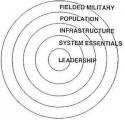How did it all start?
Egypt has long been known as a centre of stability in a volatile region, but that masked malignant problems which erupted in popular demonstrations against the 30-year rule of Hosni Mubarak on 25 and 28 January.
His National Democratic Party (NDP) monopolised political power through a mixture of constitutional manipulation, repression and rigged elections, cronyism, and the backing of powerful foreign allies.
The main drivers of the unrest have been poverty, rising prices, social exclusion, anger over corruption and personal enrichment among the political elite, and a demographic bulge of young people unable to find work.
The catalyst was fellow Arabs in Tunisia successfully overthrowing their autocratic ruler, Zine al-Abidine Ben Ali, with a popular uprising on 14 January.
Popular anger was fuelled by dozens of deaths at the hands of the security forces, while protesters' voices have been heard thanks to social media and the presence of independent news broadcasters at the scene.
Their rallying cries were "The people want the fall of the regime", "Mubarak, go", and "Illegitimate, illegitimate".















 } were manipulated by Saddam to tell him what he wanted to hear. From your link and that Allen of the CIA article: "I might add at this point that, later, there were reports that Iraq had prepared the attack force for its eventual move into Kuwait over about a three-month period. Additionally, the initial movement of Iraqi forces was reported 12 days before the actual attack against Kuwait." That also has been long known.
} were manipulated by Saddam to tell him what he wanted to hear. From your link and that Allen of the CIA article: "I might add at this point that, later, there were reports that Iraq had prepared the attack force for its eventual move into Kuwait over about a three-month period. Additionally, the initial movement of Iraqi forces was reported 12 days before the actual attack against Kuwait." That also has been long known. 


Bookmarks